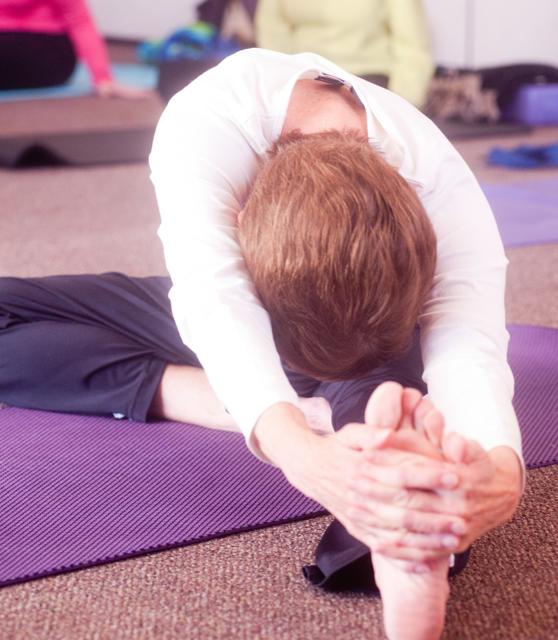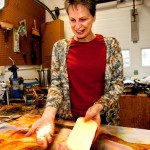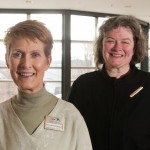- A time to try new things: A member of the North Carolina Center for Creative Retirement stretches during a yoga class. photos by Bill Rhodes
- Creativity never stops: Artist Mary Farmer in her home art studio. Farmer moved to Asheville during her golden years but has no plans to retire.
- Keeping it creative: Catherine Frank (right) of the Center for Creative Retirement and Susan Poole of the center’s College for Seniors program help the center’s members find inspiration and lifelong learning.
- There’s no place like home: Robert Weaver, director of public health and community services at MAHEC, works closely with the Center for Healthy Aging. He says that counties in WNC have some of the highest percentages of older adults over 65 in the state.
An artist never retires, maintains painter Mary Farmer, 58, who traded the waves of California for the mountains of North Carolina and transformed her garage into a studio. In addition to her own work, she teaches three encaustic classes at the Constance Williams Gallery in the River Arts District.
"I'll die with a paintbrush — well, in my case, a blowtorch — in my hand," she declares, adding, "People who create typically never want to give it up, because creating is just the thing we do." Farmer moved to Asheville from Marin County, Calif., in 2008 with husband Michael Dowling.
But it’s not just artists who are bringing a new focus on activity and intention to their golden years. Farmer's next-door neighbor Evelyn Zebro (who, coincidentally, also moved here from Marin County) works for Beverly-Hanks & Associates, but she's not here strictly for the real estate. Zebro also teaches fitness at the Asheville YMCA, water aerobics at Beaverdam Run, belongs to the Asheville Track Club and volunteers as a yoga and exercise instructor at a women's shelter.
Zebro, 62, says she’s part of the "new old group": people over 55 who are redefining retirement. "Some people just don't see these later years as the time to try new things," she notes, "but why not think outside the box?"
Not giving in
The N.C. Center for Creative Retirement has been helping people do just that since 1988. Creative retirement, says Executive Director Catherine Frank, "means living intentionally in life's second half, and not giving in to all the stereotypes about aging and retirement as being a time to sit back and rock on the front porch and watch television. It really is a time where you can realize a lot of dreams if you pursue them intentionally."
Health issues, of course, can narrow down the possibilities. But within those limits, the UNCA-based center gives its nearly 1,600 members opportunities to thrive in their next phase of life via learning, leadership, service and research. Its core program, the College for Seniors, is open to folks of all ages.
Participants pay a flat fee that ranges from $75 to $115 per term, in addition to the center’s $60 annual membership fee. This “college,” however, is not about accumulating credit hours, earning a degree or even receiving a certificate but about fostering lifelong learning and keeping people mentally and physically fit. "Education doesn’t stop with an undergraduate degree or even a graduate degree, and our members know that," says Susan Poole, the program’s director. And while almost two-thirds of them hold advanced degrees, they still crave more knowledge, she explains. In fact, members are the ones who request which classes they’d like to see offered each term.
Topics range from Italian neorealism to the joys of being a grandparent to Qi Gong. But there’s more than information at stake: Being in a learning and social environment like the College for Seniors, notes Poole, can have a profound impact on one’s overall well-being. "If we don't keep our brains, our minds and our bodies engaged, then we're going to wind up shriveling away," she proclaims. "Without it, we're just going to grow old."
That’s hardly been the fate of the Center for Creative Retirement, says Frank: In annual surveys, 30 to 50 percent of members consistently cite the organization as one of their primary reasons for moving to Asheville. "What we find is that our classes give people a structure and a spark. They can be a catalyst for people to try new things and realize that some of the things they’ve always wanted to pursue, they can do here," she reports.
New opportunities
After two years in California, Farmer says she knew precisely the kind of environment she wanted for the next stage of her life: a city with art, bookstores, movie theaters, an airport and plenty of live theater. Zebro, too, cites the region’s culture, openness and beauty as major draws offering opportunities for new experiences.
"The baby boomers were that 'me' generation, and I think there's still people that are saying, 'What do I want to do now?'” she notes. “But now that, maybe, their children are more mobile and they don't have to sit down and only be a grandparent, they start to think, 'Maybe I'll through-hike the AT or learn to fly, quilt or contra-dance,’" she says.
These two ex-Californians are not alone, though. In 2010, 16.3 percent of Buncombe County residents were 65 or older, versus 12.9 percent statewide, census data show. "Of the 10 North Carolina counties with the highest percentages of adults over 65 in 2005, seven were in Western North Carolina," says Robert Weaver, director of public health and community services at the Mountain Area Health Education Center.
Some of them relocated here, he notes, but there are plenty of people who grew up here and simply chose to stay. Being close to family is another common lure: Farmer and her husband, for example, moved her mother-in-law from Florida to Mars Hill last year.
Coming home
And while Farmer isn’t committed to spending the rest of her life in Asheville, she does find something special about this mountain mecca with a big-city feel that she hasn’t experienced before.
“This is the first place where, when I'm driving back to Asheville and I feel myself start winding up the mountains, I feel myself coming home,” she notes, adding, “That's never happened before.”
But then, after a pause, Farmer smiles and says, "I've got a little bit of gypsy blood in me, and who knows? Maybe I will move again. Maybe I'll go live in a Paris penthouse overlooking the Eiffel Tower. But today, at this moment, I don't plan on it."
— Caitlin Byrd can be reached at 251-1333, ext. 140, or at cbyrd@mountainx.com.








Before you comment
The comments section is here to provide a platform for civil dialogue on the issues we face together as a local community. Xpress is committed to offering this platform for all voices, but when the tone of the discussion gets nasty or strays off topic, we believe many people choose not to participate. Xpress editors are determined to moderate comments to ensure a constructive interchange is maintained. All comments judged not to be in keeping with the spirit of civil discourse will be removed and repeat violators will be banned. See here for our terms of service. Thank you for being part of this effort to promote respectful discussion.